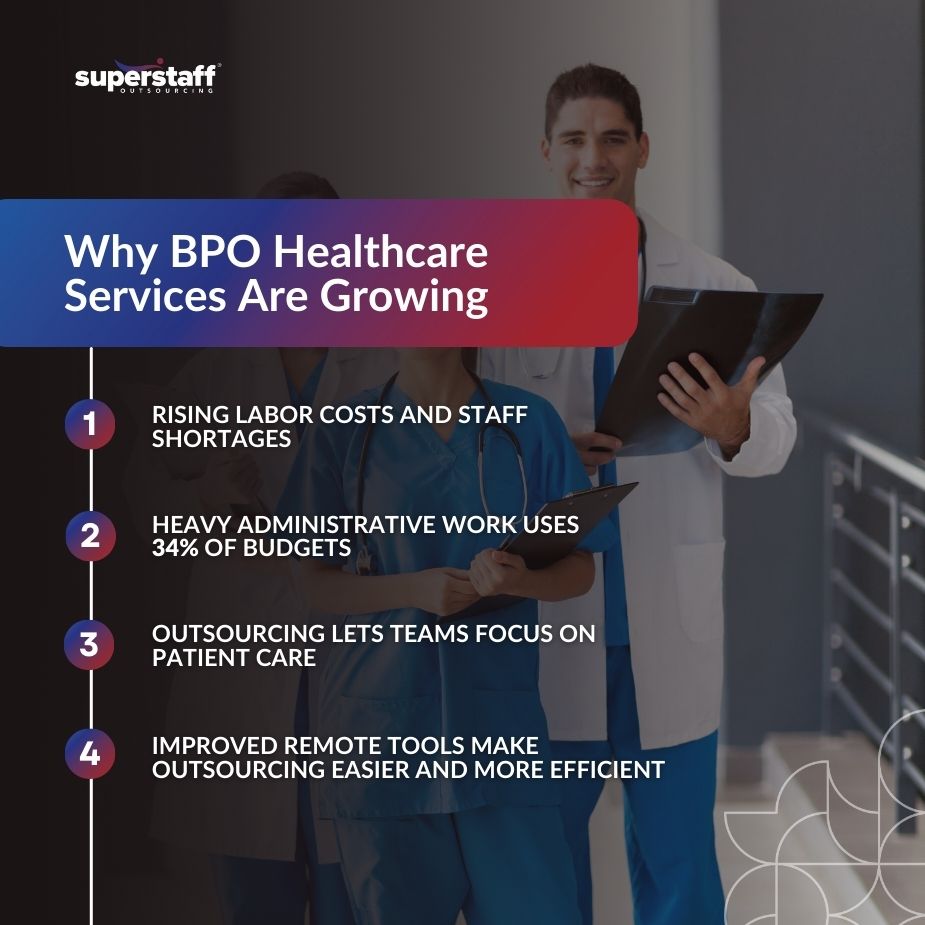
Healthcare organizations are under growing pressure to control spending while keeping patient care consistent. Hospitals, clinics, and insurance providers must manage rising operational costs, ongoing labor shortages, and strict regulatory standards.
To address these challenges, more organizations are turning to BPO healthcare services. Business process outsourcing (BPO) in healthcare refers to the practice of hiring external vendors to handle non-clinical tasks. These tasks include billing, customer service, IT support, and other essential back-office functions.
This article explains why BPO healthcare is becoming more common, what services are typically outsourced, the benefits and risks of outsourcing, and who can benefit most from this strategy.
Why BPO Healthcare Services Are Growing

Several reasons are driving the expansion of BPO healthcare across the industry. Here are the most common ones:
1. Higher Labor Costs and Staffing Gaps
Healthcare systems across many countries are struggling with staff shortages. Hiring, training, and keeping skilled workers are becoming more expensive. Outsourcing helps reduce this pressure by shifting routine work to outside vendors.
2. Heavy Administrative Work
Administrative duties consume significant time and resources, covering areas such as billing, coding, compliance, and paperwork. To save time and enhance accuracy, many providers choose to outsource these tasks.
Research shows that administrative expenses make up roughly 34% of healthcare spending in the U.S., with hospitals spending around 26.6% of their budgets on administrative activities.
3. Need to Focus on Patient Care
By outsourcing non-core tasks, healthcare teams can focus more on clinical care. This improves the patient experience and helps providers maintain quality standards.
4. Better Tools for Remote Support
With secure systems and faster internet, it’s now easier for remote teams to handle services like data entry, IT support, and scheduling. These changes make BPO healthcare more practical than ever.
Common BPO Healthcare Services
Healthcare organizations outsource a wide range of support tasks. Some of the most frequently outsourced services include:
-
Revenue Cycle Management
This includes outsourcing medical billing, coding, and claims processing. External teams help ensure claims are submitted correctly and payments are collected faster.
-
Medical Transcription
Transcribing doctor notes and patient records is time-consuming. BPO companies often have trained staff to handle this efficiently.
-
Data Entry and Records Management
Organizing patient data accurately is critical. BPO providers offer structured solutions for secure data handling.
-
Customer Service and Patient Scheduling
Call centers and scheduling services help manage patient appointments, inquiries, and follow-ups. These functions can be handled remotely by skilled representatives.
-
IT Support and Infrastructure Maintenance
Maintaining systems, managing networks, and handling tech-related issues are commonly outsourced to improve uptime and reduce delays.
These services help reduce the burden on in-house teams while improving efficiency.
Benefits of Outsourcing Healthcare Operations in 2025
The benefits of outsourcing healthcare operations in 2025 are clear. Here’s what organizations can gain:
1. Lower Operational Costs
By outsourcing, healthcare providers can save on hiring, training, and maintaining full-time staff. This helps reduce costs with healthcare outsourcing and allows organizations to reallocate funds to direct care.
2. Access to Skilled Workers
BPO vendors often employ staff with experience in healthcare operations. These professionals are trained in specific tasks like coding, billing, and compliance management.
3. Improved Compliance
Staying up to date with healthcare laws is a full-time job. BPO providers often specialize in compliance, helping reduce the risk of errors or penalties.
4. Flexibility and Scalability
Outsourcing allows healthcare organizations to scale services up or down based on demand. For example, hospitals can increase support during flu season or reduce it during off-peak periods.
Risks and Things to Consider Before Outsourcing
While BPO healthcare offers many advantages, it’s important to be aware of potential challenges:
-
Data Security and Privacy Risks
Patient information must be protected. Providers must ensure BPO partners follow strict data protection rules.
-
Vendor Selection
Choosing a vendor with healthcare experience is important. Not all outsourcing companies understand the specific needs of medical providers.
-
Clear Contracts and SLAs
Service level agreements (SLAs) must be clear and measurable. These agreements help track performance and set expectations.
-
Hidden Costs
Transition costs, training, or technology integration may not be included in the original contract. Organizations should budget for these upfront.
With proper planning and vendor vetting, these risks can be managed.
Who Should Consider BPO Healthcare Services?
Outsourcing is not just for large hospitals. Many types of healthcare organizations can benefit from BPO healthcare:
1. Small and Midsize Practices
Clinics with limited staff can outsource billing and customer service to stay organized and efficient.
2. Hospitals
Hospitals dealing with high patient volumes may outsource scheduling, helpdesk support, or claims processing to manage workloads more effectively.
3. Insurance Companies and Healthcare Payers
Outsourcing helps payers process claims faster and with fewer errors. This leads to better service for members.
4. Healthcare Startups and Growing Networks
Organizations investing in digital platforms but lacking internal tech teams can benefit from outsourced IT and data support.
BPO solutions are flexible and can be adjusted based on each organization’s size, goals, and operational needs.
Is Healthcare Outsourcing the Right Move?
BPO healthcare is becoming a preferred option for many healthcare providers and payers. It helps control costs, improve service delivery, and ease the pressure on internal teams.
By choosing the right outsourcing partner, organizations can:
- Lower overhead
- Access experienced staff
- Maintain compliance
- Improve patient and customer experience
As the demand for better healthcare services continues, more organizations are choosing to reduce costs with healthcare outsourcing. When managed well, this approach supports long-term success while allowing providers to stay focused on care.
If you want to improve your operations, consider SuperStaff. They specialize in healthcare outsourcing with tailored solutions that fit your needs. SuperStaff can help you get the best results from your BPO healthcare investment.






